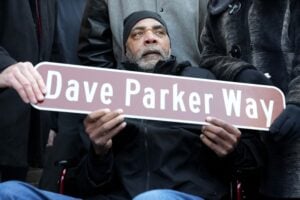Dave Parker, owner of two batting titles, a Most Valuable Player Award, and two World Series rings, has died. He was 74 years old and had suffered from Parkinson’s Disease in recent years. Parker was scheduled to be inducted into the National Baseball Hall of Fame on July 27. Along with Dick Allen, he was elected by the Classic Baseball Era Committee last December. Now both will be inducted posthumously.

Two-Time Batting Champion, MVP Dave Parker Has Died
Parker played in the major leagues for 19 years with the Pittsburgh Pirates (1973-83), Cincinnati Reds (1984-87), Oakland Athletics (1988-89), Milwaukee Brewers (1990), California Angels (1991), and Toronto Blue Jays (1991). For his career, he hit .290/.339/.471, 339 HR, 1,493 RBI, and 121 OPS+ while stealing 154 bases. Parker was at his best as a Pirate, winning two consecutive National League batting titles in 1977 and 1978, the NL MVP Award in 1978, and three Gold Glove Awards for his play in right field. He was a seven-time All-Star, including in 1979 when he was MVP of the All-Star Game. He was on World Series winners with Pittsburgh in 1979 and Oakland in 1989.
We are heartbroken to learn of the passing of Hall of Famer Dave Parker.
A legendary Pirate, Parker spent 11 years in a Pirates uniform, winning 2 batting titles, an MVP award and a World Series Championship in 1979.
The Cobra was part of the inaugural Pirates Hall of Fame… pic.twitter.com/UuikGxw6dI
— Pittsburgh Pirates (@Pirates) June 28, 2025
At six-foot-five, 235 pounds in his playing days, Parker was an imposing figure. He was called up to make his major league debut with Pittsburgh on July 12, 1973. When he entered the clubhouse in San Diego on that day, Pirates shortstop Dal Maxvill said, “I don’t know what he does or who he is, but I’m glad he’s on our side.”
Parker was considered the best all-around player in the game from 1975-79. In those years, he hit .321/.377/.532, 114 HR, and 490 RBI, stealing 84 bases, and accumulating 31.1 of his 40.1 career WAR. Parker had 72 outfield assists and was worth 42 Fielding Runs Above Average. (Defensive Runs Saved were not available in those ancient times.) He also committed 66 errors during that period. He led the NL in outfield errors in 1975 and the majors in 1976-79. That’s because Parker played right field like a madman. He tried to make plays nobody else would try. As a result, he led the NL in putouts in four of those seasons. Baserunners who dared challenge the arm of Parker frequently died on the bases.
The Cobra
Nothing typified Parker’s approach to the game like the night of June 30, 1978, against the New York Mets at Three Rivers Stadium. The Pirates bullpen had squandered a 3-2 lead and surrendered four runs in the top of the ninth. Parker’s one-out, two-run triple in the bottom of the ninth inning brought the Pirates within a run at 6-5. The next batter, Bill Robinson, hit a fly ball to shallow right field. Parker tagged and sprinted toward home. Mets right fielder Joel Youngblood fired a strike to catcher John Stearns, beating Parker to the plate by several feet. Parker, a high school football star in Cincinnati, lowered his shoulder and collided with Stearns, damn near knocking him into next week.
I was there, in a seat high above first base. I swear I could feel the collision in my seat. Stearns miraculously hung on to the ball. The Mets had a victory, and Parker had a broken cheekbone. It didn’t slow down the player known as “the Cobra.” Parker remained in the lineup the rest of the season. First, he tried a hockey goalie mask. Later, he switched to a specially designed batting helmet with a face mask.
Controversy
Parker’s time in Pittsburgh wasn’t without controversy. The steel mills were closing, and folks who were out of work couldn’t relate to a brash Black man who had become baseball’s first million-dollar player. He had objects thrown at him from the stands, including a battery. An accumulation of injuries due to his reckless play over the years had taken their toll, too. From 1981-83, he hit just .272/.310/.430 and wasn’t the same outfielder. By then, it had become time to move on.
Once his career in Pittsburgh had died, there were flashes of the old Parker. Rejuvenated in his hometown, in 1985, the Cobra hit .312/.365/.551, 42 HR, and an NL-leading 125 RBI for the Reds. With the A’s in 1989, he complemented the “Bash Brothers” well, hitting .264/.308/.432, 22 HR, and 97 RBI, en route to his second World Series ring. During this period, his reputation took a hit when he was embroiled in baseball’s cocaine scandal in 1987. He owned up to his mistake and returned to Pittsburgh often in retirement, being welcomed as a conquering hero each time.
Our Loss That Dave Parker Died
Parker’s book, Cobra: A Life of Baseball and Brotherhood, is one of the best books written by an athlete that this writer has ever read. It concentrated on his time with the Pirates and Reds. At the end of the book, he promised there would be a sequel, beginning with his time with the A’s. When Parker learned of his Hall of Fame selection, he told the MLB Network, “I’ve been holding this speech for 15 years.” Our loss that we won’t get to read that second book or hear that speech.
Main Photo Credit: © Charles LeClaire-Imagn Images
The post Two-Time Batting Champ and MVP Dave Parker Passes Away appeared first on Last Word On Baseball.
